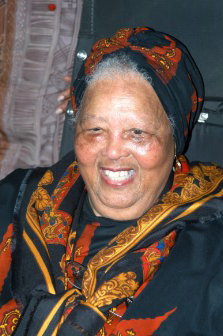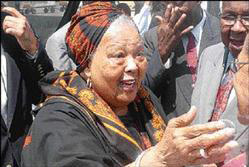The Honourable Dr Louise Bennett Coverley O.M.
7 September 1919 - 27 July 2006
Miss Lou ded an gaan. Lang liv de Afrikaan Queen!
Miss Lou passed away at the Scarborough Grace Hospital , Toronto , Canada on 27 July 2006 , having collapsed at her home earlier that morning.
 Her death marks the passing of a legend. Never mind historical icons such as Alexander Bustamante and Norman Manley, Louise Bennett was the mother, father and soul restorer of the Jamaican nation. No one had done more to assist the Jamaican people in understanding themselves and their uniqueness as a people crafted from the ravages of slavery and colonialism than Miss Lou. The Honourable Marcus Mosiah Garvey focused upon the African identity of Jamaican and other African heritage people in the diaspora and the need for us to reconnect with Africa and reclaim our heritage in the Motherland. Miss Lou devoted a lifetime to helping the nation to understand who it is, where it came from, how where it came from shaped who it is and how, in the process, ways of communicating were forged which were unique to Jamaica and the way the nation experienced and related to its world and to the world outside itself. Her death marks the passing of a legend. Never mind historical icons such as Alexander Bustamante and Norman Manley, Louise Bennett was the mother, father and soul restorer of the Jamaican nation. No one had done more to assist the Jamaican people in understanding themselves and their uniqueness as a people crafted from the ravages of slavery and colonialism than Miss Lou. The Honourable Marcus Mosiah Garvey focused upon the African identity of Jamaican and other African heritage people in the diaspora and the need for us to reconnect with Africa and reclaim our heritage in the Motherland. Miss Lou devoted a lifetime to helping the nation to understand who it is, where it came from, how where it came from shaped who it is and how, in the process, ways of communicating were forged which were unique to Jamaica and the way the nation experienced and related to its world and to the world outside itself.
Louise Bennett was a child prodigy where the Jamaican language was concerned. Amazingly, while not yet a teenager, she determined that the language she and those around her spoke was the language that should be validated and used as a medium for expressing oneself in writing. She had experienced that language as the one in which ordinary people gave meaning to their lives, expressing their needs and wants, their joys and their sorrows, their aspirations and their regrets. Yet, the medium of teaching and instruction in school was not the language of the Jamaican people but a foreign language which the majority of the nation could neither speak nor write.
By the age of 14, she had written her first poem in Jamaican English, popularly called 'dialect' at the time. Her creative abilities were apparent even then and in her 20s she won a scholarship to attend the prestigious Royal Academy of Dramatic Arts (RADA) in London , graduating as a dramatist, actress and performer. She brought the art of dramatic expression to her exploration, interpretation and use of the Jamaican language, validating it as a language long before it was accredited as such in the 1960s, largely through the work of people like Frederic Cassidy and Robert Le Page. a scholarship to attend the prestigious Royal Academy of Dramatic Arts (RADA) in London , graduating as a dramatist, actress and performer. She brought the art of dramatic expression to her exploration, interpretation and use of the Jamaican language, validating it as a language long before it was accredited as such in the 1960s, largely through the work of people like Frederic Cassidy and Robert Le Page.
The bibliography in the seminal writings of both these academics, especially
Jamaica Talk (Cassidy: 1961) and Dictionary of Jamaican English (Cassidy & Le Page: 1967) include references to Louise Bennett's work dating back to 1942 when the Gleaner published her Dialect Verses , one of her earliest published works.
Miss Lou worked with repertory companies in various parts of England where West Indian ex-servicemen and students from the islands as well as the Windrush generation of migrants would have settled.
She did more than most to develop an awareness and understanding of Jamaican folklore, of the sayings, proverbs and philosophies, the values and principles of the ordinary working people. Using the medium of poetry, drama and story telling in what was predominantly an oral tradition, Miss Lou put the Jamaican people in touch with themselves, with their wisdom, their irony and their quirkiness. Above all, she put them in touch with their inner selves and their connectedness to Africa by pointing up the fact that the entire society and its culture is riddled with African retentions. Those retentions could still be seen today in rites of passage, in religious practices, in music, in the vocabulary and forms of speech in the Jamaican language, in percussion, in food, in superstitions. Miss Lou brought it all alive through drama, poetry, prose, chants, dance and song, and through her radio and television shows that were hugely popular with people of all ages in Jamaican society, shows such as Laugh with Louise, Miss Lou's Views, The Lou and Ranny Show and the television show 'Ring Ding'.
When, in the 1960s and 1970s, children started to arrive in Britain in increasing numbers from Jamaica to join parents and entered British schools, a major issue in the assessment of their 'intelligence' and their ability to cope with the schooling system was their language. Because they were not seen as having a language in its own right that was different from English, they were deemed to be speaking and writing broken English as a variant of 'standard' English and therefore judged as being poorly equipped to get on in the English schooling system. Louise Bennett's work was invaluable in that it provided the ammunition both to counteract those damaging and erroneous assessments and to give Jamaican speakers a sense of self and a confidence in the language that they spoke. It also helped to demonstrate that those Jamaican children and their parents were speaking an entirely different language and that they were being put at an educational disadvantage and subjected to damaging stereotyping if that were not recognised.
Miss Lou became ambassador at large for the Jamaican people, representing their country and its cultural heritage across the world and giving permission to those of us involved in song writing, music making, performance poetry, theatre and teaching, to claim the language and be assertive in our use and projection of it. As such, she inspired and created space for other early pioneers such as Andrew Salkey, Kamau Brathwaite, and latterly Benjamin Zephaniah and the world renowned Linton Kwesi Johnson.
Miss Lou married Eric Winston Coverley in 1954 and was widowed in 2002.
She was awarded the Order of Jamaica in 1974, the Order of Merit in 2001, the Institute of Jamaica.s Musgrave Silver and Gold Medals for distinguished eminence in the field of Arts and Culture and the Norman Manley Award for Excellence in the field of Arts. She held the Honorary Degree Of Doctor of Letters from the University of the West Indies and from York University in Toronto .
We in education and social and cultural life in Britain and Jamaicans at home and in the second diaspora worldwide owe her an enormous debt and give thanks for her long life and pioneering life's work.
Professor Gus John |




